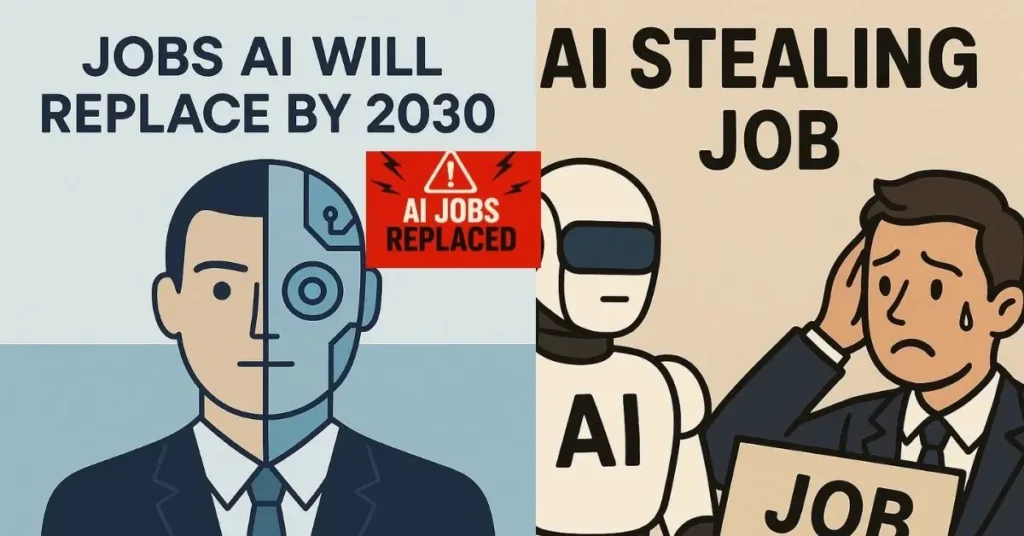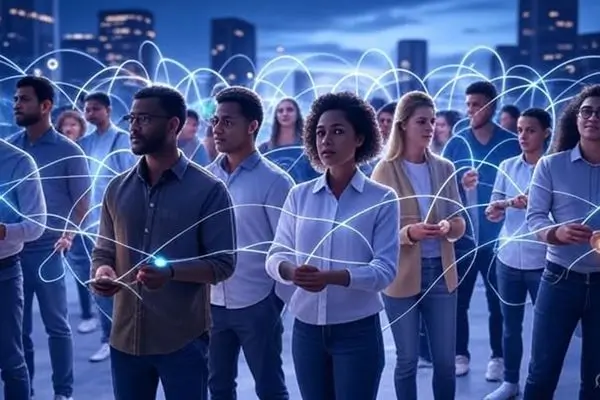Jobs AI Will Replace: Picture this: You’re at your desk, handling the same routine tasks day in and day out, when suddenly, a smart algorithm steps in and does it better, faster, and without breaks.
That’s the reality hitting many workers as artificial intelligence (AI) advances at lightning speed. Top 20 Highly paid AI Jobs: How Land on Them Easily
Job List
Table of Contents
AI isn’t just a tool
It’s a game-changer that’s set to replace millions of jobs worldwide.
But which roles are most at risk? If you’re worried about “AI jobs that will be replaced,” you’re not alone.
Recent reports from the World Economic Forum predict that AI could displace 85 million jobs by 2025, while creating 97 million new ones in emerging fields.
The key? Adaptation. In this post at hstech.io, I’ll walk you through 12 typical jobs AI is poised to take over, explain how it happens, and share tips on staying ahead. Let’s explore so you can future-proof your career.
List of 12 Jobs AI Will Replace
Here is list fo jobs AI will replace them soon, check the list and keep going to update yourself on daily basis, learn new and advanced skills. They will keep you allive in the demand market.

1. Data Entry Clerk: The End of Manual Typing
Data entry clerks spend their days typing information into spreadsheets, databases, or software systems. It’s a role that’s been around forever, handling everything from customer records to inventory lists. These jobs are often entry-level, requiring attention to detail but little creativity.
AI is replacing them through tools like Optical Character Recognition (OCR).
Imagine scanning a stack of invoices—AI extracts the data, checks for errors, and inputs it automatically. Software like Google Cloud Vision or Abbyy FineReader does this in seconds, with near-perfect accuracy. No more human errors or long hours. Businesses love it because it’s cheaper and faster. If you’re in this field, the shift is already happening—think about how banks now auto-process checks without clerks.
2. Receptionist: Virtual Greeters Take Over
Receptionists are the friendly faces at offices, answering phones, greeting visitors, and booking meetings. They keep things running smoothly, often juggling multiple tasks like directing calls or managing sign-ins.
AI steps in with virtual receptionists and chatbots that handle these duties 24/7.
Tools like Microsoft Teams bots or Receptionist AI can answer queries, schedule appointments, and even check in guests via kiosks. They never get tired or make scheduling mistakes.
Hotels and clinics are rapidly adopting this approach—why pay for a full-time person when AI can do it for a fraction of the cost? The human touch might linger in luxury settings, but for most offices, AI is the new front desk.
3. Scheduling Assistant: AI Calendars That Never Double-Book
Scheduling assistants coordinate calendars, find open slots, and avoid conflicts for busy executives or teams. It’s all about organization and communication to keep meetings on track.
AI replaces this with smart assistants like x.ai or Google Calendar’s built-in features. These tools scan everyone’s availability, suggest times, and send invites automatically.
They even factor in time zones or preferences—no more back-and-forth emails. Companies like Salesforce use AI for this, saving hours weekly. If your job is all about calendars, AI is making it obsolete—focus on higher-level planning to stay relevant.
4. Basic Customer Support Agent: Chatbots Handle the Basics
Basic customer support agents deal with common questions, like product info or simple troubleshooting. They answer calls or chats, providing quick help to keep customers happy.
AI chatbots are taking over with natural language processing. Platforms like Zendesk or Intercom’s bots respond instantly to thousands of queries.
They learn from past interactions, getting smarter over time. Retail giants like Amazon use them for FAQs, reducing wait times to zero. Human agents shift to complex issues, but entry-level support? AI has it covered, available round-the-clock without breaks.
5. Cashier: Self-Checkouts and AI Scanners Rule
Cashiers scan items, process payments, and handle customer interactions at stores. It’s a staple retail job, often part-time and high-turnover.
AI is replacing them with self-checkout kiosks and computer vision systems.
Amazon Go stores let you grab items and walk out—AI tracks and charges automatically. Walmart’s scanners use AI to detect missed items. No lines, no errors. As mobile payments rise, cashiers fade. Retail workers might move to stocking or customer service, but the checkout role is shrinking fast.
6. Telemarketer: AI Voices Make the Calls
Telemarketers call potential customers to sell products or run surveys. It’s repetitive, with scripts and high rejection rates.
AI voice bots with NLP handle this now. Tools like Google Duplex or custom scripts hold conversations, personalize pitches, and follow up. They sound human and work non-stop.
Sales teams use them to generate leads and cut costs. Regulations might limit this, but for surveys or outbound calls, AI is efficient. If you’re in telemarketing, pivot to strategy or relationship-building.

7. Basic Copywriter: AI Writes the Content
Basic copywriters create product descriptions, blog posts, or SEO articles. It’s about clear, engaging writing for marketing or websites.
AI tools like ChatGPT or Jasper generate this instantly. Feed a prompt, get polished text.
They optimize for SEO, too. Brands use AI for e-commerce listings, saving time. Human writers handle creative work, but routine content? AI dominates. Start specializing in strategy or editing to adapt.
8. Bookkeeper: AI Automates the Numbers
Bookkeepers record transactions, manage ledgers, and reconcile accounts. It’s detail-oriented work for small businesses. AI accounting software like QuickBooks AI automates categorization and reports. It flags errors and integrates with banks.
No manual entry needed. Firms save on labour, with accuracy up. Bookkeepers evolve into advisors, but fundamental roles vanish.
Want to Learn Data Science?: A complete Beginners 5-step Guide
9. Legal Assistant or Paralegal: AI Scans the Documents
Legal assistants review papers, research laws, and draft documents. It’s research-heavy with lots of reading.
AI tools scan thousands of pages, extract key clauses, and summarise the information. Harvey AI or Casetext do this for lawyers. They suggest arguments too. Law firms cut research time by 70%. Paralegals focus on strategy, but routine tasks go to AI.
10. Factory Line Worker: Robots Do the Repetitive Tasks
Factory line workers sort, assemble, or pack products. It’s physical and repetitive.
AI robots with vision and arms handle this. Boston Dynamics’ bots learn tasks fast. Factories like Foxconn use them for efficiency. Humans oversee, but line jobs drop—Upskill in robotics maintenance for the future.
11. Warehouse Worker (Low-Skill): AI Bots Pick and Pack
Warehouse workers pick, pack, and move goods. It’s labour-intensive with tight deadlines.
AI logistics bots like Amazon’s Kiva navigate and fetch items. They pack orders, too. Speed and safety improve. Workers shift to supervision, but fundamental roles shrink.
12. Basic Financial Analyst: AI Generates the Reports
Basic financial analysts analyze data, spot trends, and create reports.
AI processes datasets in seconds, detecting patterns. Tools like Tableau AI or IBM Watson build dashboards. Humans interpret, but routine analysis? AI takes over.
The Bigger Picture: What This Means for You
AI replacing jobs isn’t all doom—it’s evolution. These 12 roles show where automation hits hardest. But new jobs emerge in AI management or ethics. The key? Upskill now.
Learn AI basics or pivot to creative fields.
Stats back this: McKinsey says 45% of work activities could be automated by 2025. Yet, reskilling creates opportunities. Don’t panic—prepare.
FAQ: Your Questions on AI Job Replacement
1. Which jobs are safe from AI?
Roles that require human empathy, such as therapy or leadership, are more challenging for AI. Creative fields like art direction or strategy also stay human-led.
2. How can I protect my job from AI?
Learn AI tools to enhance your work. Focus on skills like problem-solving or ethics that machines can’t match. Continuous learning is key.
3. Will AI create more jobs than it replaces?
Yes, experts predict net gains. For every job lost, new ones in AI design or data ethics pop up. The shift is about adaptation.
4. What’s the first step if my job is on this List?
Assess your skills. Take online courses in AI or related fields. Network on LinkedIn for insights into emerging roles.
AI’s rise is unstoppable, but so is human ingenuity. What’s your take—scary or exciting? Share in the comments. For more on tech trends, check our AI Skills Guide or visit the World Economic Forum reports.
ivl2wn
Pingback: Realme Unleashes with Powerful 15,000 mAh Battery, Concept Phone